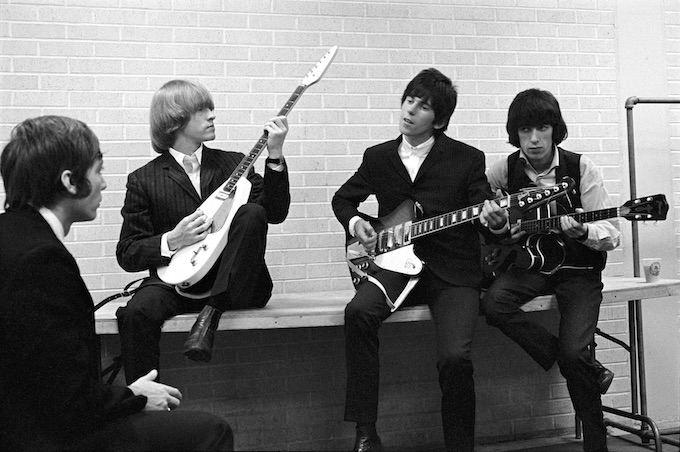 By Ray Dafrico
By Ray Dafrico
Contributing Writer
THE QUIET ONE (2019); Dir. Oliver Murray; Documentary about Bill Wyman featuring Eric Clapton, Bob Geldof, Andrew Oldham, Glyn Johns; Opens Friday, July 5 at the Landmark’s Midtown Art Cinema; Trailer here.
Upfront, a disclaimer of sorts, I am a huge Rolling Stones fan. As a rock and roll musician myself, I believe them to be archetypal band, from the quintessential, charismatic front man Mick Jagger; the effortlessly cool, eternal Keith Richards; to the diverse, multitalented abilities of Brian Jones, Mick Taylor and Ron Wood. Ultimately however the band was always at its heart a rhythm and blues band, with its foundation in the rhythm section of Charlie Watts and Bill Wyman, the subject of a new documentary THE QUIET ONE.
The film, directed by Oliver Murray, features commentary from Eric Clapton, Bob Geldof, Andrew Oldham, Glyn Johns and others. Wyman was the Stone who never received the attention that some of his bandmates did, but amongst musicians, he is considered one of the world’s best bass players. Non-musicians and casual fans probably don’t know that much about him as he was content to stand stoic and mysteriously to the side and back of the stage, being the glue, holding down a machine firing on all cylinders. As Wyman himself says in the film: “We could blown any band off a stage.”
The film begins with Wyman recalling his earliest memories. Born as Bill Perks on October 24, 1936, Wyman recalls the bombings during World War II and how deeply this experience affected him. He could remember classmates suddenly not showing up for school after a bombing raid due to the fact that they had been killed. The film then reveals Wyman’s relationship, or rather lack of one, with his parents. He was alienated from them and felt closest with his grandmother through whom he discovered collecting and documenting things—something that Wyman, along with photography and music, would continue to do extensively for the rest of his life. He would become the unofficial archivist for The Rolling Stones, and part of this film’s attraction is its unseen footage from Wyman’s own collection. The death of his grandmother when Wyman was still a child devastated him. His father then pulled him out of school and forced him to work as a bet collector in a local pub. Not unlike a Dickens novel, you feel the pain of this childhood.
Tired of living in dangerous working class Penge, England, Wyman, then still named Bill Perks (which he hated), joined the British armed forces in the late 1950s and ended up stationed in Germany where he discovered rock and roll via Armed Forces Radio and records which American GIs had. He also befriended a man named “Gordon Lee Wyman,” who Wyman describes as “quite a character.” Young Bill Perks was impressed enough to change his name legally to Bill Wyman. Soon after, and under the spell of rock ’n’ roll, Wyman modified his first bass by hand and started his first band The Cliftons.
Upon his return to England he went to an audition that a friend had told him about that would lead to Wyman joining the soon-to-be Greatest Rock and Roll Band in the World. At this point, Wyman’s life accelerates at warp speed—constant touring, fame, riots, rebellion, arrests, sex, and, for most of the band, drugs. Wyman never had any interest in the latter. However, he does describe smoking a joint that was laced with animal tranquilizer and said, “ I don’t need this.”

The Rolling Stones on tour in North America. Photo credit: Bob Bonis Archives Inc./Promotone. Used with permission.
The 1960s were a cultural phenomenon, and The Rolling Stones were front and center. Although the Stones were reaching incredible artistic heights at the time, authorities targeted the band as a threat to society. “It was really us vs. them” is how Wyman describes it, and he then goes on to talk about the deterioration and eventual death of bands founder Brian Jones, in 1969. Despite a momentous concert in London’s Hyde Park and a very successful US tour, the dark times would continue later that year at the free concert at Altamont, California, where a man was stabbed to death directly in front of the stage while they played. Wyman says he doesn’t like to talk about it because it was so horrible.
The 1970s saw the Stones having to flee the U.K for France because they were so far in debt and British taxes were so high. Wyman dreaded leaving and recalls the madness of recording EXILE ON MAIN STREET in the basement of Keith Richard’s villa in Villefranche-sur-mer. What he would discover was he really liked France and struck up friendships with the likes of Marc Chagall and James Baldwin. Wyman would end up keeping a home there to this day. The Stones continued to tour and record throughout the ’70s, but Wyman felt the need to express himself creatively and was the first member of the band to release a solo LP, MONKEY GRIP, in 1974, followed by “STONE ALONE” in 1976. While these records were mostly just side projects for Wyman, he scored a worldwide hit in 1981 with the song “(Si Si) Je Suis un Rock Star.”

Production Still – Bill Wyman working in his archive. Photo credit: Luke Varley. Copyright: The Quiet Ones Ltd./Promotone. Used with Permission.
While he never fell for drugs, sex, however, was Wyman’s vice, and he explains that his loneliness was probably the cause of it. Hearing this in context with his childhood, it is easy to imagine how he could feel this way. Combined with the isolation that fame can bring, it is also easy to understand when Wyman states that it was “sometimes very difficult to keep one’s sanity.” He was first married in the late 1950s to Diane Cory, and they had a child, Stephen from the marriage. When the couple divorced, he felt his son should stay with his mother as he was constantly working and touring. He later found that his son was miserable, sick, and not even being fed. He won custody, and Stephen lived with him from then on. Swedish model Astrid Lundstrom was Wyman’s companion throughout most of the 1970s.
The Rolling Stones were never a band without controversy and Wyman would receive his share when he fell in love with and then married 18-year-old Mandy Smith on June 2, 1989. The tabloids had a field day. In the film Wyman, who was 51 at the time, reflects upon what a mistake it was. He would later go on to meet and marry his current wife, Suzanne Accosta in April 1993. Wyman officially left The Rolling Stones in January 1993 after the very successful STEEL WHEELS comeback tour. He says wanted to leave on a high note and felt that was the time. Wyman talks of his life after The Stones playing with his band The Rhythm Kings, and in the film’s conclusion he tells a wonderful story about a meeting with Ray Charles.
A line from the film that struck me was Wyman saying that all of his heroes were “the little guys.” Director Oliver Murray successfully takes us through Wyman’s journey of a somewhat reluctant rock star’s life. THE QUIET ONE is a surprisingly touching film that speaks from the heart and one which I would highly recommend regardless if you are a Rolling Stones fan or not.
Contributing Writer Ray Dafrico is a guitarist, singer/songwriter and founding member of The Nightporters and Kathleen Turner Overdrive.

